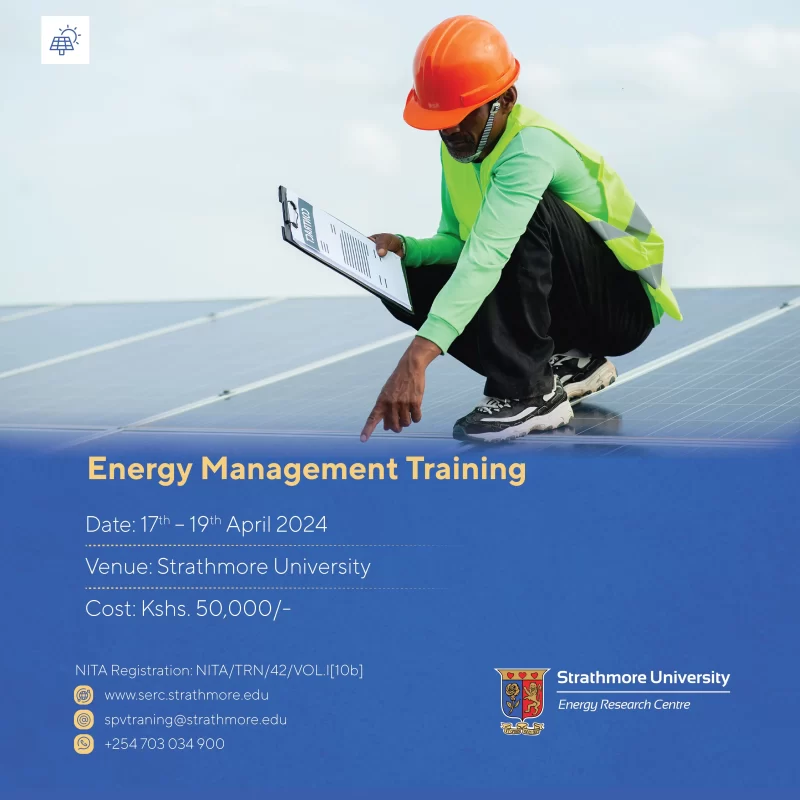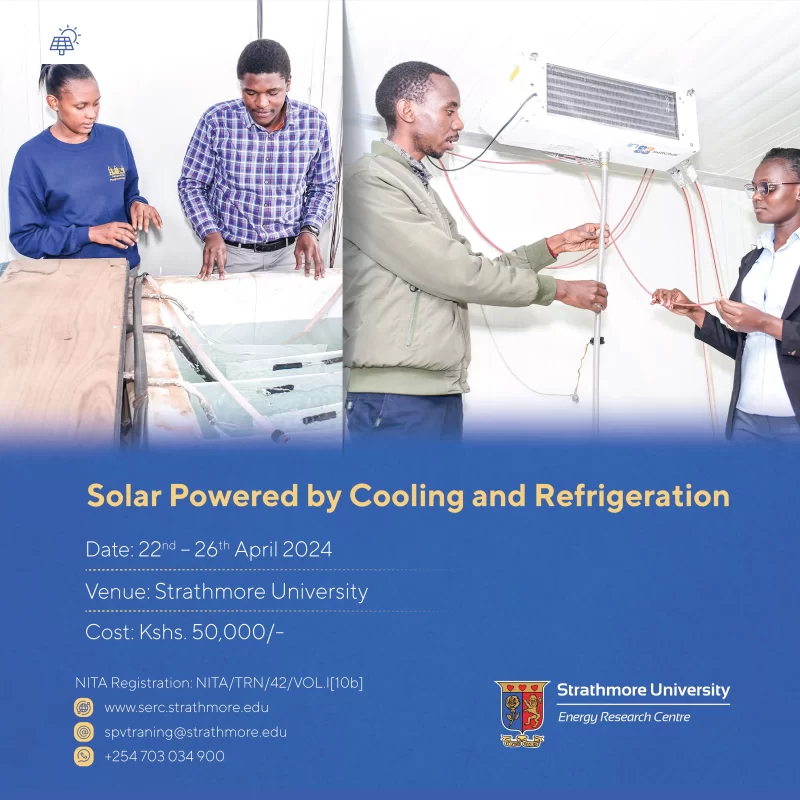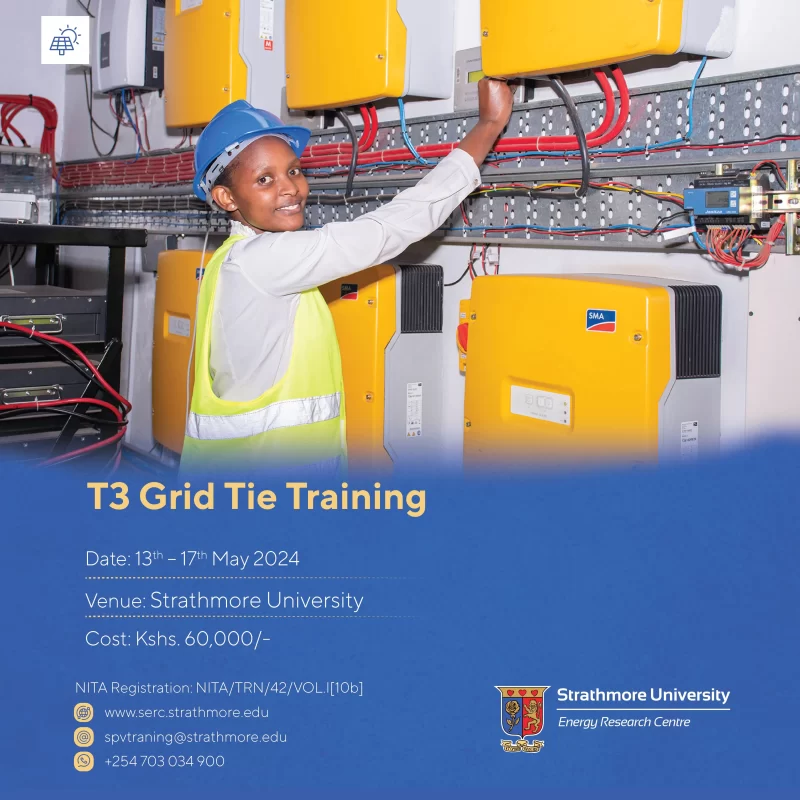
Dates: 17th – 19th April 2024
Cost: Ksh 50,000
Email: spvtraining@strathmore.edu
Tel: +254(0)703034900

Dates: 17th – 19th April 2024
Cost: Ksh 50,000
Email: spvtraining@strathmore.edu
Tel: +254(0)703034900

Dates: 22nd – 26th April 2024
Cost: Ksh 50,000
Email: spvtraining@strathmore.edu
Tel: +254(0)703034900

Dates: 13th – 17th May 2024
Cost: Ksh 60,000
Email: spvtraining@strathmore.edu
Tel: +254(0)703034900

As part of our goal to care for people and the planet, we must look at sustainable methods of living. It is for this reason that the Climate Compatible Growth (CCG) organises an annual Workshop that look into considering a path of low carbon development whilst simultaneously unlocking profitable investment in green infrastructure, opening up new markets and supporting delivery of the Sustainable Development Goals. This year the workshop was a collaboration of Strathmore University through the Strathmore Energy Research Centre and the CCG Research Team themed, Nurturing cross-sectoral connections for a climate-compatible future. The workshop venue was the serene environment of Maanzoni Lodge, which aligns with the theme of sustainability by recycling water from all the output sources.
The two-day workshop kicked off with assurance from government stakeholders from the Ministry of Energy and Petroleum and EPRA, that the government is committed to renewable energy matters. Dr Faith Wandera highlighted that the government is keen on using the same approach where there is cross-sectoral collaboration on integrated national energy planning, from electricity planning to whole energy systems planning that includes clean cooking which is one of the government’s key agendas by 2028. It was also mentioned that awareness is key in policy-making to ensure the ordinary person gets to understand the impact of CCG.
Robina Abuya from the British High Commission assured of the British government’s support towards this course. She also stated that the British High Commission’s goal was towards Green Urbanization, Green industrialisation and Sustainable Development. The deliverable is to create a cleaner, greener environment.
Dr Lara Allen from the University of Cambridge says CCG has networks in 6 countries. Kenya is the leader and the frontier of these programs. The goal is to create special interest groups of researchers and people who will be able to continue with this mission. She also highlighted that the plan is to position Kenya as a State that will be able to receive research funding from diverse financial institutions that will have a positive long term impact on the people in Kenya.
From Strathmore University we had Dr. Eng. Julius Butime from the School of Computing and Engineering Sciences. He assured that Strathmore is ready to support this project and it has been at the forefront of research in CCG. He also intimated with enthusiasm the strategic position that Strathmore University is at in ensuring sustainability of the CCG programme in Kenya as a center of excellence and capacity building to ensure sustainability.
The discussions now delved into Kenya’s Clean Cooking Sector led by Dr Faith Wandera. It was noted through research that 68.5% of Kenyans rely on traditional methods of cooking and of the 68.5% which is equivalent to 9.1 Million households 1.7 million households are urban and 7.4 million households are rural. Firewood, Charcoal and LPG are the 3 key primary sources of fuel in Kenya. Within this discussion, they have developed an action plan which includes;
Next, we had a presentation from Mungai Kihara from the Directorate of Electricity and Renewable Energy. He remarked that Kenya has the opportunity to grow. 90% of Kenya’s power comes from green energy, and since Kenya’s GDP is mostly built by agriculture, green hydrogen has a good capability to grow. Anne Kiburi Senior Specialist Energy Transition Plan “ Kenyas is at its turning point and has the opportunity to grow”. The discussion was based on the just launched Nenya Energy Transition Investment Plan that provides a harmonized roadmap for the energy sector with a holistic approach that includes the investment requirement for its implementation. Also, It sets the stage for the development of energy sector targets to be incorporated into future National Blueprint. Martin Mutembei from SERC stated that the Kenya CCG Network programme takes a holistic and cross-sectoral approach to addressing climate-compatible and inclusive growth.
The programme’s ambition is driven by strong and enduring national, international partnerships and co-creativity. He also mentioned of the current focus in terms work with the concept of “Data-to-Deal” where the term Data-to-Deal refers to actions taken throughout an entire process that runs from data collection, system modeling, and development planning, all the way through to national financing strategies and project finance arrangements to the agreement of a deal (investment), all driven by a strong stakeholder engagement process.
The workshop later went into different panel discussions that were built around the Ppecial Interest Groups (SIGs) discussing:
Article written by: David Kimathi